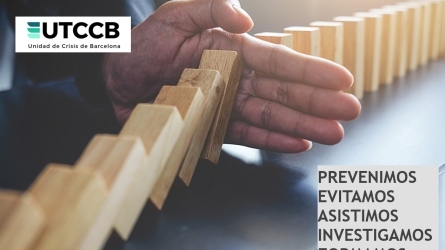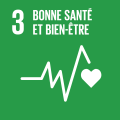
Building resilience in times of coronavirus
Description
This Summer Course will be held face-to-face and there will also be the possibility of participating live online through ZOOM. In the registration process, please select the participation of your choice: face-to-face or live online
In December 2019, the first cases of a new virus began to be known, which was later called Covid19. Much has been researched and written since then on the mechanisms of contagion, why in some people this disease is so serious and how to protect ourselves from it. But there is much less information that deal with the psychological effects of becoming seriously ill from this disease or how the grieving processes of those who have lost a family member have been affected by sanitary conditions of Covid19. There is also less information about how the pandemic and the different forms of lockdowns have impacted on the general population and on groups of special vulnerability.
This course, designed for students with basic notions of psychology, medicine, nursing or public health seeks to offer a broad vision, based on evidence, on the mental health of people during and after the pandemic. Two thematic blocks will be the main elements of its content: understanding how and why the pandemic has affected us and knowing the possible alternatives for preventive and rehabilitative interventions.
Objectives
To learn specific risk and protective factors in health crisis situations.
To recognise the specificities of this crisis in relation to others and to be able to establish analogies and differential analyses.
To learn about the characteristics of intervention plans (prevention and rehabilitation) in the face of this pandemic.
Activity directed to
- University students
- Students not from university
- Teachers
- Professionals
- All public
Methodology
The methodology used in the sessions will be explanatory lessons with small consolidation and discussion activities. The dynamics of the lessons may include: Video teaching, Case studies, Group discussions, Problem solving, Written exercises, Role playing, Teamwork & Quick tests.
Program
18-08-2021
Registro
Presentation by the Director of the activity
- Alicia Alvarez --- Directora Asistencial y de Investigación UTCCB - PARTICIPA VÍA ZOOM
El impacto de la SARS-COV-2 en población general/El impacto de la SARS-COV-2 en población general:
“Los efectos biológicos y psicológicos de la incertidumbre y el estrés/The biological and psychological effects of stress and uncertainty“
- Ingeborg Porcar Becker UTCCB - Directora técnica
“Factores de riesgo de las personas y el entorno social durante la pandemia/Risk factors related to the person and the social situation during the pandemic“
- Ingeborg Porcar Becker UTCCB - Directora técnica
“Factores de riesgo asociados al confinamiento y a la gestión de la pandemia/The psychological impact of Covid19 on general population: Risk factors associated to the lockdowns and special conditions due to the management of the pandemic:“
- Ingeborg Porcar Becker UTCCB - Directora técnica
Break
“Factores de protección de las personas y sus situaciones personales/Protective factors associated to the person and her or his social situation during the pandemic“
- Ingeborg Porcar Becker UTCCB - Directora técnica
“Otros factores que influyen en la salut mental durante la pandemia/Other variables with impact on the mental health of persons during the pandemic“
- Ingeborg Porcar Becker UTCCB - Directora técnica
Synthesis
19-08-2021
Repaso de conceptos más importantes tratados el día anterior y resolución de dudas
El impacto de la SARS-COV-2 en diferentes poblaciones/ The psychological impact of Covid 19 on different population groups:
“Afectación en pacientes de SARS-COV-2 ingresados en la UCI/ Covid patients admitted to ICU“
- Ingeborg Porcar Becker UTCCB - Directora técnica
“Afectación en personas en duelo/Bereaved“
- Ingeborg Porcar Becker UTCCB - Directora técnica
Break
“ Afectación en la infancia/Children“
- Ingeborg Porcar Becker UTCCB - Directora técncia
“Afectación en personas mayores/Elderly“
- Ingeborg Porcar Becker UTCCB - Directora técnica
“Afectación en profesionales sanitarios/Healthcare professionals“
- Alicia Alvarez --- Directora Asistencial y de Investigación UTCCB - PARTICIPA VÍA ZOOM
“Afectación en migrantes y otros grupos vulnerables/Migrants & Other vulnerable groups“
- Alicia Alvarez --- Directora Asistencial y de Investigación UTCCB - PARTICIPA VÍA ZOOM
Actividad grupal de reflexión
Synthesis
20-08-2021
Repaso de conceptos más importantes tratados el día anterior y resolución de dudas
Prevención de los efectos psicológicos de la pandemia/How to prevent the chronification of the psychological effects of the pandemic:
“How to assess the impact/¿Cómo evaluar el impacto?“
- Alicia Alvarez --- Directora Asistencial y de Investigación UTCCB - PARTICIPA VÍA ZOOM
“Sesiones psicoeducativas y técnicas grupales de recuperación/Psychoeducation & group techniques for recovery“
- Alicia Alvarez --- Directora Asistencial y de Investigación UTCCB - PARTICIPA VÍA ZOOM
Break
“Técnicas de autocuidado para intervinientes/Self-care techniques for responders“
- Ingeborg Porcar Becker UTCCB - Directora ténica
“Terapia centrada en el trauma y terapias grupales cognitivo-conductuales/Trauma therapy & CBT group techniques“
- Ingeborg Porcar Becker UTCCB - Directora técnica
Synthesis
Closing session
- Ingeborg Porcar Becker UTCCB - Directora Técnica
- Alicia Alvarez --- Directora Asistencial y de InvestigaciónUTCCB - PARTICIPA VÍA ZOOM
Directors
PhD in clinical Psychology and a specialization on emergencies, catastrophes, and urgencies as well as in PTSD and trauma. She has 11 years of experience both on clinical practice and crisis response management. Currently she is the Care&Research director at the UTCCB from UAB and combines this position with her job as lecturer in different universities as Universitat de Barcelona, Universitat Politècncia de Barcelona, Universitat Oberta de Catalunya and the Harvard Medical School from Boston.
Speakers
Psychologist (Ph.D), Accreditation in Clinical Psychology and Crisis Management, Associated Professor at UAB, Founder and Director of the UTCCB, a Trauma, Crisis and Conflict Center at the Faculty for Psychology at UAB.
Registration fees
| Face-to-face | Until 18-08-2021 |
|---|---|
| 105,00 EUR | |
| 89,00 EUR | |
| 74,00 EUR | |
| 26,25 EUR | |
| 89,00 EUR | |
| 0 EUR |
| Live online | Until 18-08-2021 |
|---|---|
| 105,00 EUR | |
| 89,00 EUR | |
| 74,00 EUR | |
| 26,25 EUR | |
| 89,00 EUR | |
| 0 EUR |
Venue
Miramar Palace
Pº de Miraconcha nº 48. Donostia / San Sebastián
Gipuzkoa
Miramar Palace
Pº de Miraconcha nº 48. Donostia / San Sebastián
Gipuzkoa
Sustainable development goals
Agenda 2030 is the new international development agenda approved in September 2015 by the United Nations. This agenda aims to be an instrument to favour sustainable human development all over the planet, and its main pillars are the eradication of poverty, a reduction in equality and vulnerability and fostering sustainability. It is a unique opportunity to transform the world up to 2030 and guarantee human rights for all.

3 - Good health and well-being
Guarantee a healthy life and foster the well-being of all people of all ages. Key issues: universal healthcare coverage, sexual and reproductive health, reduction in the number of road accident casualties, pollution and chemical products, reduction in maternal and neonatal mortality, the end of epidemics such as AIDS, combating hepatitis and other water-borne diseases, drug and alcohol prevention, control of tobacco.
More information









